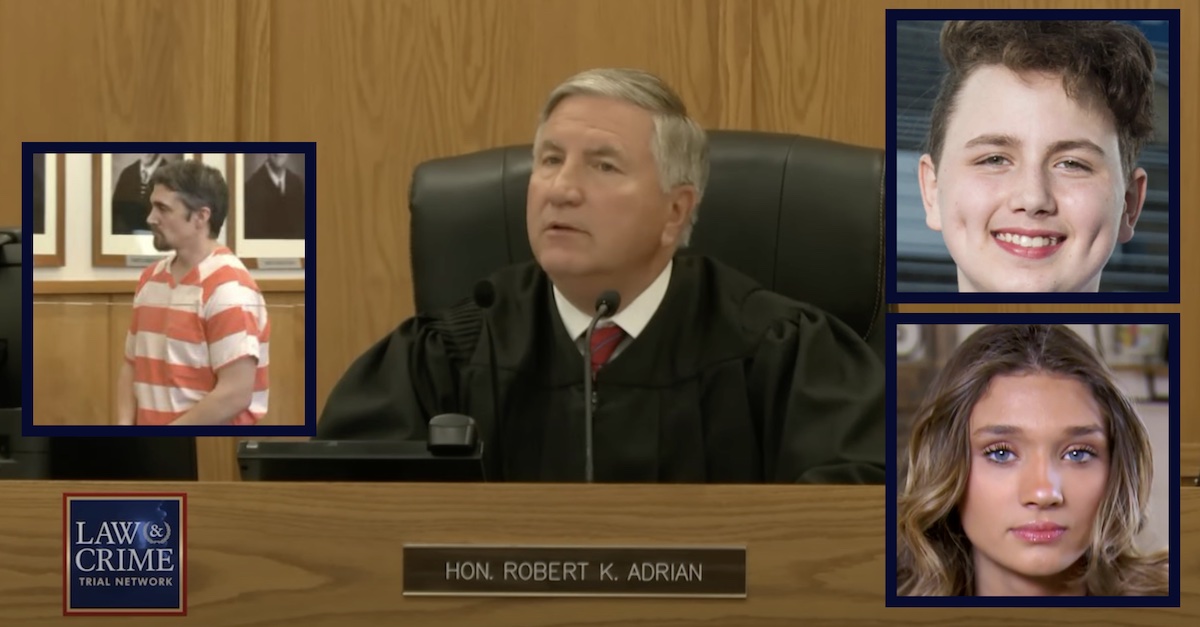
Inset left: Tim Bliefnick (via Law&Crime). Center: Judge Robert K. Adrian (via Law&Crime). Inset top right: Drew Clinton (Quincy High School). Inset bottom right: Cameron Vaughan (Inside Edition/screengrab)
A judge was removed from office years after he found an 18-year-old guilty of sexual assault, reversed himself to keep the defendant from having to serve a mandatory prison sentence, and then “lied under oath on multiple occasions” when pressed about his reasoning, the Illinois Courts Commission said.
In the Friday filing, the commission determined that Judge Robert K. Adrian of the Eighth Judicial Circuit and Adams County “thwarted” the law when he refused to sentence Drew Clinton to the mandatory four years for sexually assaulting then-16-year-old Cameron Vaughan at graduation party in May 2021.
Law&Crime is naming Vaughan, now 18, because she has spoken publicly about the case and acknowledged double jeopardy issues with bringing Clinton back to court.
Instead of sticking with Drew Clinton’s guilty bench trial verdict for “committ[ing] an act of sexual penetration by placing his finger in the vagina of the victim when he knew the victim was unable to give knowing consent,” Adrian decided to reverse the conviction — but only after considering post-trial motions.
While Adrian asserted that the reversal was done because he realized after the fact that prosecutors had failed to prove their case, the commission said that the judge’s own words at sentencing undermined his story. Those words, the filing said, showed that Adrian knew what the law required and that he misapplied it anyway because he didn’t want to send Clinton — whom he called a “young man” — to prison:
The Court has considered the motions. The Court has considered the arguments of counsel and the written motions themselves. This Court is required to do justice. This Court is required to do justice by the public, it’s required to do justice by me, and it’s required to do justice by God.
It’s a mandatory sentence to the Department of Corrections. This happened when this teenager – because he was and is a teenager, was two weeks past 18 years old. He has no prior record, none whatsoever. By law, the Court is supposed to sentence this young man to the Department of Corrections. This Court will not do that. That is not just. There is no way for what happened in this case that this teenager should go to the Department of Corrections. I will not do that.
The Court could find that the sentencing statute for this offense is unconstitutional as applied to this Defendant. But that’s not going to solve the problem because, if the Court does that, this Court will be reversed by the Appellate Court, and Mr. Clinton will end up in the Department of Corrections.
Adrian then took aim at parents for allowing teenagers to drink alcohol and allowing “coeds and female people to swim in their underwear in their swimming pool.”
The commission scolded Adrian, writing that he appeared to be saying he “did not believe Clinton deserved to go to prison for sexual assault because the female victim was voluntarily intoxicated and swam in her underwear.”
According to the commission, Adrian’s reversal amounted to a circumventing or thwarting of the law, but the misconduct only continued when he yelled at a prosecutor for liking a social media post and provided “unbelievable” testimony to the Judicial Inquiry Board about his reasoning in the Clinton case.
The prosecutor, Adams County’s Joshua Jones, testified that the judge lashed out in court after his wife told him about the social media like of a post critical about the reversal.
“Mr. Jones, you may leave the courtroom. Mr. Jones, you may leave the courtroom. I don’t get on social media but my wife does and she saw the thumbs up you gave to people attacking me. I can’t be fair with you. Get out,” Adrian was quoted saying.
Though the judge later called to apologize, the commission found that Adrian’s “intemperate and unwarranted remarks toward Jones” fell far short of what is expected of a judge.
“This misconduct was willful, prejudicial to the administration of justice, and brought the judicial office into disrepute,” the filing said, also noting that Jones continued prosecuting cases before Adrian after the two patched things up.
One of those cases was the jury trial of convicted “Family Feud” murderer Tim Bliefnick, who was sentenced to life in prison back in August for the home invasion slaying of his estranged wife Becky Bliefnick.
In a small-town Quincy, Ill., connection, Tim Bliefnick was represented by defense attorney Casey Schnack, the daughter of Drew Clinton’s attorney Andrew Schnack III, who testified as part of Robert Adrian’s disciplinary matter.
The commission found that Adrian’s “subterfuge” — claiming that he reversed the conviction based on a lack of evidence, rather than not wanting Clinton to serve years in prison — was willfully carried out in “bad faith.”
“Here, we find that respondent acted in bad faith and engaged in willful misconduct, conduct prejudicial to the administration of justice, and conduct that brought the judicial office into disrepute when he intentionally circumvented the law by reversing his prior guilty finding,” the filing continued.
Writing that there is “clear and convincing evidence” that Adrian “gave untruthful testimony before the Board” under oath, the commission determined the judge should be removed for a “flagrant pattern of misconduct,” as such “intentional, dishonest, and extensive misconduct demonstrates respondent’s utter disregard for the truth, the judiciary, and our justice system.”
In response, Adrian reportedly called his removal a “miscarriage of justice,” claiming he “did what was right” and has “always told the truth about it.”
Have a tip we should know? [email protected]

